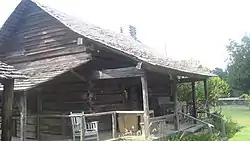Germantown Colony and Museum
The Germantown Colony and Museum is a museum and historical preservation project in Webster Parish, Louisiana about 7 miles (11 km) north of Minden in northwestern Louisiana, USA. It was listed on the National Register of Historic Places as Germantown in 1979.
Germantown | |
 Countess Leon's House at Germantown Colony | |
  | |
| Location | Off U.S. 79, Webster Parish, Louisiana, seven miles northeast of Minden, Louisiana |
|---|---|
| Coordinates | 32°42′0″N 93°13′50″W |
| Area | 1 acre (0.40 ha) |
| Built | 1835 |
| NRHP reference No. | 79001100[1] |
| Added to NRHP | March 12, 1979 |
Germantown was the earliest religious communal settlement in Louisiana. It was founded in 1836 by Germans, adherents to ideas of religious leader Maximilian Ludwig (1788-1834), the "Count of Leon", and it lasted as a commune until 1871. Its founding was led by Elisa Leon (d.1881), the "Countess of Leon", widow of Maximilian Ludwig.[2] In the colony, all property was owned in common and observance of religious principles was required. Though the colony was not very large, only about thirty-five people, it worked together and prospered. Its pacificism and general privation contributed to hardship during the American Civil War which contributed to its ending.
Germantown once had numerous houses, barns, stores, and shops, as well as a kitchen-dining hall and a "bachelor's hall". The historic buildings are mostly gone; the listing included just two contributing buildings: Countess Leon's home and the kitchen-dining hall, both built of hewn logs with dovetailing at their corners. The kitchen-dining hall has a dry wall stone cellar and an adjacent frame shack.[2] Many windows have been replaced, and none of the porches are original. These surviving historic buildings, and sympathetic rustic others, still "convey in their crude and primitive character something of the life style of the Germantown settlers."[2]
The site also includes a barn and other buildings deemed non-contributing, a log cabin which includes a bathroom, and a well.[2]
In 2022 the site, several miles off U.S. 79 and about nine miles north of Interstate 20, continues to be operated as a museum.[3][4]
Gallery
 Germantown Colony Museum sign in Webster Parish, Louisiana
Germantown Colony Museum sign in Webster Parish, Louisiana Wagon in blacksmith shop at Germantown Museum
Wagon in blacksmith shop at Germantown Museum Sugar cane press at Germantown
Sugar cane press at Germantown Open field at Germantown
Open field at Germantown
References
- "National Register Information System". National Register of Historic Places. National Park Service. November 2, 2013.
- "National Register of Historic Places Inventory/Nomination: Germantown". National Park Service. Retrieved November 19, 2022. With accompanying eight photos from 1974 and 1979
- "Germantown Colony Museum". Louisiana Department of State.
- Google maps measurements of mileage
External links
- Germantown Colony Museum - Louisiana Department of State
- Friends of the Germantown Colony Museum - Facebook site